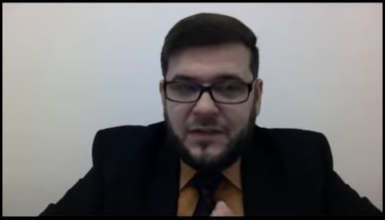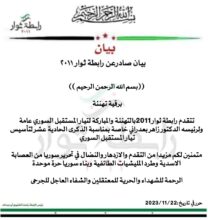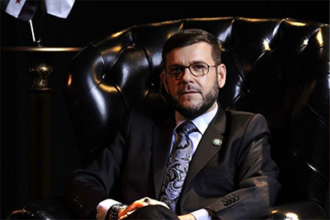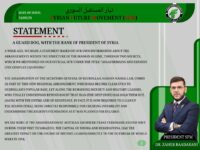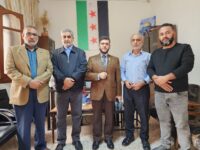Syrian Students: Role and Importance

Introduction:
Syrian students constitute an important segment of Syrian society, and they suffer from significant challenges as a result of the Syrian crisis. A general overview of their situation across various levels reveals the following:
- Union Reality:
Syrian students suffer from weak union organization due to difficult security conditions and the widespread geographical dispersion of students. Student activists face persecution and harassment, limiting their ability to work freely. Students’ primary focus is on meeting their basic needs, which reduces their interest in union activities. - Intellectual Reality:
Syrian students exhibit great intellectual diversity due to the different experiences they have undergone. The ongoing events in Syria have a significant impact on student thinking, making it fluctuating and uncertain. Many students are striving to build a new national identity that fits their current circumstances. - Political Reality:
Many Syrian students have been politically active since the outbreak of the Syrian revolution in 2011, both inside and outside Syria. Syrian students are politically divided, reflecting the political diversity of Syrian society. They also face challenges in political work, such as repression and detention. - Deteriorating Economic Reality:
Most Syrian students live in poverty, which affects their ability to continue their studies. Many students resort to working to meet their living needs, which in turn impacts their academic performance. Students also struggle to secure scholarships, limiting their opportunities to pursue further education. - Academic Reality:
Syrian students are known for their high academic level, thanks to the acceptable yet below-standard Syrian educational system. The educational process in Syria faces numerous challenges, such as a shortage of teaching staff and the destruction of school and university infrastructure. As a result, many students seek better educational opportunities abroad.
Positives of the Role of Syrian Students:
We believe that Syrian students play a pivotal role in building Syria’s future. They possess immense energy and potential that can significantly contribute to the country’s revival. Among the most important positive aspects of their role are:
- Energy and Creativity:
Syrian students are characterized by great creative energy and renewed enthusiasm, enabling them to develop innovative ideas and solutions to the challenges facing the country. - Education and Qualification:
Students represent the new generation carrying the latest knowledge and skills, allowing them to contribute to the development of various sectors. - Communication and Interaction:
Students have a remarkable ability to communicate and interact with various segments of society, making them future leaders capable of building bridges between different parties. - Flexibility and Adaptability:
Syrian students have shown great adaptability to the difficult circumstances and challenges they face, making them resilient and capable of confronting future challenges. - National Spirit:
Syrian students possess a strong sense of nationalism and a desire to build a better future for their country, driving them to work diligently and persistently. - Political Awareness:
Many Syrian students possess a high level of political awareness, enabling them to actively participate in political and social life. This is something I have personally observed through my direct and indirect meetings within Syria at the headquarters of the Syrian Future Movement, or outside Syria. - Syrian Students Represent a Driving Force for Positive Change in Society:
They are capable of challenging the status quo and building a better future.
Syrian students are a true asset to the country, and they can play a pivotal role in rebuilding Syria if they are effectively and thoughtfully supported and empowered.
Negatives of Syrian Students Engaging in Public Affairs:
Despite the significant positives that can arise from student involvement in public affairs, there are several negatives and challenges they may face, which must be taken into account:
- Dispersal and Division:
The wide diversity of opinions and political orientations among students may lead to a fragmentation of efforts and an inability to reach a unified vision, weakening their impact. - Political Exploitation:
Some students may be exploited by political, factional, or ideological militias to achieve their own goals, which negatively affects their reputation and the student movement as a whole. - Neglect of Studies:
Heavy involvement in political work or public affairs in general may lead to neglect of studies and a decline in academic performance, harming students’ futures. - Personal Safety Risks:
Students may face persecution and harassment from security forces or extremist groups, putting their lives at risk. - Difficulty Balancing Work and Studies:
Students often struggle to balance the demands of their studies with public work, which impacts their performance in both areas. - Lack of Experience:
Some students lack sufficient experience in public work, particularly in political matters, leading to poor decision-making or avoidable mistakes. - Social Tensions:
Engaging in political work can sometimes create tensions in social relationships with friends and family, especially if the student’s views differ from those of their surroundings.
To overcome these negatives, Syrian students must build on sound scientific foundations and rely on dialogue and constructive discussion. They should also support one another, form cohesive work teams, and, most importantly, commit to nonviolence in expressing their opinions while avoiding violence and extremism in all its forms. Those who fail through peaceful means will only fail further through violence, as the current Syrian experience has taught us.
Additionally, students should balance public work with their studies, striving for excellence in both areas. They should not hesitate to seek support from educational institutions and human rights organizations to benefit from their expertise.
Despite these challenges, the role of Syrian students in building the future of their country remains significant. Therefore, we believe in the necessity of providing them with all the support needed to achieve their aspirations, and this is what we strive for in our various offices within the Syrian Future Movement.
Challenges Facing Syrian Students:
Syrian students face numerous challenges that hinder their effective participation in building their community. Among the most prominent of these challenges are:
- The Syrian Crisis:
This has led to the displacement of millions of Syrians, making stability and education top priorities. Consequently, this has reduced opportunities for community participation. The war has also resulted in the destruction of schools, universities, and other public facilities, adversely affecting the quality of education and learning opportunities. Many students suffer from psychological trauma due to the events they have experienced, impacting their ability to focus, learn, and engage. - Economic Situation:
The majority of Syrians live in poverty, forcing students to work to secure their basic needs. This reduces the time available for community participation. Additionally, Syrian graduates face difficulties in obtaining suitable job opportunities, which diminishes their enthusiasm for contributing to community building. - Political Situation:
The crisis has resulted in sharp political polarization, making it difficult for students to express their opinions freely and instilling fear of aligning with any political party or movement. - Social Situation:
The Syrian community has undergone significant social transformations, affecting national identity and community values. This makes it challenging for students to define their identity and role within society. - Psychological Challenges:
Many students experience psychological trauma due to the events they have witnessed, impacting their ability to concentrate, learn, and actively participate in their communities.
Many students also lack the necessary experience for effective participation in public life, which makes them hesitant to take initiatives.
In addition to these challenges, there are other obstacles facing Syrian students abroad, such as:
- Language and Cultural Barriers:
Syrian students in host countries face difficulties in adapting to the new culture and language, which limits their opportunities for integration into the community. - Familiarization with the New Educational System:
Students may need time to adjust to the new educational system in host countries, which can impact their academic performance. - Bias and Discrimination:
Syrian students may encounter bias and discrimination from the host community, affecting their self-confidence and ability to participate.
Syrian students are the future of Syria, and they are capable of playing a crucial role in building a prosperous democratic society. To achieve this goal, they must confront the challenges they face, and we must work together to overcome them, empowering them within their community and reality.
Importance and Role:
Syrian students represent the new generation that carries the hopes and aspirations of our Syrian people. Therefore, we believe the significance of this role stems from:
- Participation in Volunteer Work:
Through providing humanitarian aid, organizing awareness campaigns, and participating in the reconstruction of affected areas. - Establishing Small Projects:
Students can establish their small enterprises, which will contribute to creating job opportunities and supporting the local economy. - Engagement in Cultural and Artistic Activities:
Students enrich the cultural and artistic life of the community and promote national identity. - Involvement in Political and Community Movements:
Students can express their opinions and demands. This is what we advocate for and recommend to them, as existing entities are gateways for them to choose how they want to serve the interests of their country and people. - Connecting with the Outside World:
Students can build bridges of communication with the outside world and attract investments and aid to Syria. - Defending Human Rights:
They can work on defending human rights and the rights of minorities, striving to build a just and tolerant society. - Awareness and Advocacy:
Students can use social media and other platforms to raise awareness about issues that concern the Syrian community.
As for the role of Syrian students in society, they are the leaders of tomorrow, responsible for building a better community for future generations through education and continuous development. They can acquire the skills and knowledge necessary to assume leadership positions in various fields and act as a driving force for positive change in society. This can be achieved through participation in student and community activities, offering creative ideas and solutions to the problems facing society, and serving as a bridge for communication between different segments of society, as well as between Syria and the outside world. This contribution helps in building positive relationships and exchanging experiences. Additionally, they can preserve the cultural identity and heritage of Syria, promoting it globally, which enhances Syria’s standing in the world. Moreover, they can form a qualified workforce that contributes to rebuilding Syria and developing its economy.
To answer the question of how Syrian students can effectively contribute, we see the following:
- Participation in Student Activities:
By joining student clubs and associations, participating in discussions and events, and creating new initiatives if they do not exist. - Providing Assistance in Volunteer Projects:
Such as the reconstruction of affected areas and offering support to those in need. - Launching Community Initiatives:
That contribute to solving the problems facing the community. - Raising Awareness on Important Issues:
Expressing their opinions and communicating with others. - Continuing Their Education:
Striving to obtain higher academic degrees to develop themselves and contribute to building the community.
Visions and Aspirations:
Undoubtedly, as shown, Syrian students face significant challenges, but they also represent hope for a better future for their country.
Thus, we have visions and aspirations that can help them fulfill their civil duties, summarized as follows:
- Investing in Education:
By striving to obtain the highest academic and knowledge degrees through diligent study and hard work. This includes staying informed about the latest developments in their fields and continually seeking to develop their skills and capabilities, with a focus on studying sciences and technology due to their importance in building the future. - Connecting with Other Students:
Engaging with students both in Syria and abroad, whether they are Syrian or from other nationalities and cultures, to exchange experiences and knowledge, and to contribute to their development. - Critical Thinking and Creativity:
Encouraging the analysis of information critically, distinguishing between right and wrong, fostering creative thinking, and providing innovative solutions to problems. - Preserving National Identity:
By recognizing their history and culture, maintaining their national identity, and raising awareness of the importance of preserving Syrian cultural heritage. - Defending Human Rights:
Advocating for and raising awareness about human rights as a viable alternative to the dire Syrian reality. This includes combating all forms of discrimination and working towards building a just and equal society for everyone.
Activating the Role of Syrian Students:
To effectively enable Syrian students in building the future of their country, the authorities can take a range of measures, including:
- Creating an Encouraging Educational Environment:
By updating curricula to align with contemporary realities, fostering critical and creative thinking, and providing adequate educational resources, including books, laboratories, and libraries. This also involves modern training for teachers, supplying them with the latest teaching methods, encouraging scientific research, supporting student research, and organizing scientific competitions. - Involving Students in Decision-Making:
By forming student councils and giving students the opportunity to participate in decisions that affect them. Gathering student opinions on issues of concern through active listening and encouraging student-initiated initiatives. - Providing Professional Development Opportunities:
Organizing training programs across various fields, activating student exchange programs, and providing opportunities for students to participate in cultural and scientific exchange programs, in addition to supporting entrepreneurship and encouraging students to start their own projects. - Enhancing Community Participation:
By allowing authorities to institutionalize community involvement, encouraging students to participate in volunteer work, organizing awareness programs on community issues, and fostering partnerships between educational institutions and community organizations. - Providing Psychological and Social Support:
Through psychological support programs for students affected by the crisis, along with organizing recreational and cultural activities. - Protecting Students’ Rights:
By ensuring the right to education and guaranteeing that all students receive a quality education, protecting students from violence, providing a safe environment for them, and combating all forms of discrimination against students. - Promoting International Cooperation:
Through cultural exchange programs with other countries, especially Arab nations and developed countries, and attracting investments to develop the education sector.
Aspirations for Community Support for Syrian Students
In our aspirations for the community’s role in supporting and empowering Syrian students, we believe that providing full support to them is essential for playing an active role in society. The community can take a series of steps and measures, including:
- Creating a Supportive Environment:
Welcoming Syrian students and assisting them in integrating into society, especially in host countries. This includes fostering tolerance and acceptance of cultural and social diversity, as well as collaborating with schools to provide academic and psychological support for students. - Providing Financial Support:
Offering scholarships for outstanding students, promoting a culture of donation to educational institutions that support Syrian students, and supplying textbooks and educational materials to those in need. - Raising Awareness about the Importance of Education:
Organizing awareness campaigns on the significance of education and the role of students in society, encouraging parents to support their children in their studies. - Participating in Student Activities:
Attending events organized by students and volunteering in activities aimed at supporting them. - Advocating for Educational Improvements:
Pressuring authorities to enhance educational services, improve the quality of education, and provide necessary resources. Defending students’ rights to receive a quality education and equal opportunities. - Building Communication Bridges:
Establishing channels to communicate with Syrian students, listening to their opinions and suggestions, and exchanging experiences and knowledge with them.
Our vision emphasizes the community’s role in helping students feel a sense of belonging, overcoming the challenges they face, and contributing to building a better future for Syria.
Conclusion
Historical human experiences demonstrate that investing in education and youth is an investment in the future. Many countries have proven that supporting and empowering students can lead to genuine revitalization and positive transformations in society.
Among the key takeaways from these experiences is that education is fundamental and serves as the cornerstone of any advancement. Thus, it is crucial to provide an encouraging and attractive educational environment, equipping students with the knowledge and skills necessary to confront future challenges.
Additionally, students should be encouraged to actively participate in society by offering opportunities for volunteering and community service, linking curricula to labor market needs, and providing chances for practical training.
There is also a pressing need to offer psychological and social support to help students overcome the difficulties they encounter, as well as opportunities for students to start their own projects and support entrepreneurship. Furthermore, it is essential to establish channels for dialogue and communication between students and officials, to listen to their opinions and suggestions, and to strengthen international cooperation in the field of education and knowledge exchange.
In conclusion, supporting and empowering students is an investment in the future, and it is essential for building more just and prosperous societies.
For this reason, we believe in a significant role for the authorities in Syria, as well as for communities and educational institutions, to work together to provide the appropriate environment for the growth and development of students and to engage them positively in public affairs, first for their own benefit, second for their community, and ultimately for their country.
Presidency office
Dr. Zaher Ihssan Baadarani
Article
Syrian Future Movement (SFM)
